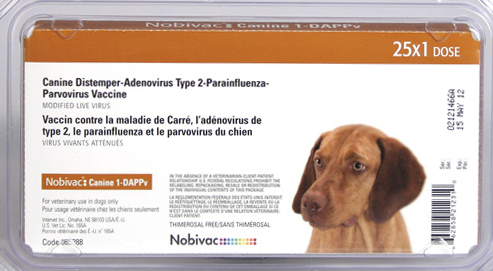Until your puppy has ALL their shots, you are its environmental protection against disease! Here is a simplified example of how Vaccinations work:
I have a litter of 10 puppies. I give the first vaccination at 7 weeks, only 5 puppies immune systems are developed enough to make antibodies to those diseases. I give the second vaccination at 10 weeks, another two pups develop antibodies. I give the third vaccination and the remaining two pups HOPEFULLY have developed antibodies. I give a fourth just to make sure, SINCE I HAVE NO WAY OF KNOWING WHO HAS DEVELOPED ANTIBODIES!! The ONLY sure way to know if your pup has developed antibodies to any disease is to have a " Blood Titer test "done at your veterinarians office . This can be expensive but worth it if you really want to know. Please do not space your puppies Vaccination closer than 3 weeks apart.
When Completing Vaccinations:
Arrange for Vaccinations to be given in the morning, on a day when your schedule will allow for low to no environmental stimulation, and you can observe your puppy. If there is a negative reaction to the Vaccination and it is serious, you will then have plenty of time to get your puppy to the Vet during business hours!
**We vaccinate with a with a Modified Live Virus Type 5 way. Also known as a Canine 1-DAPPv, which stands for- Canine Distemper(Distemper)- Adendovirus type 1 (Hepatitis ) - Adendovirus type 2 (Respiratory Disease)- Parainfuenza(canine influenza)- Parvovirus (Parvo)Vaccine. We have our puppies on a vaccination schedule 3 weeks apart, starting at 7 weeks of age, a total of 4 vaccinations by the time the puppy reaches 16 weeks old.
DO NOT ALLOW YOUR VET TO GIVE VACCINATIONS CONTAINING LEPTOSPOROSIS (LEPTO) UNLESS YOU LIVE IN OR WILL BE TRAVELING TO AN AREA THAT HAS HIGH RISK FOR THIS DISEASE!! THE LEPTO VACCINATION HAS A HIGH RISK OF LETHAL REACTION IN CANINES!

*Rabies Vaccinations are a required vaccination your puppy will need at or around 16 weeks of age, and is required to obtain your county dog license. A Veterinarian ONLY can give this vaccination for it to be recognized by the county. Your Vet will issue you a Vaccination certificate, and may also be able to complete your dog license on behalf of the county.
* Until your puppy has completed AT LEAST the third puppy Vaccination:
*NO dog Parks, *NO rest areas on highways, *ALWAYS take your puppy in a carrier to the vets office, *DO NOT set the carrier on the floor, *DO NOT allow other animals in the office to have contact with your puppy. *DO NOT allow other clients to touch your puppy, THEY ARE THERE BECAUSE THEY HAVE MORE THAN LIKELY BROUGHT A SICK ANIMAL IN. If they weigh scale is a rubber matted one and does not get sanitized after each animal is weighed, please ask your technician to place a sanitized towel on the scale and re-zero it before you place your puppy on it. I am very strict about this, if they will not do it, find another vet. They are providing a service to you and should cater to your wishes, mine do!
* PLEASE!!
Also keep sanitizer in the form of hand wash (for hands and forearms) and Lysol spray (for shoes and feet) for yourself and visitors, and use it. You and your visitors should be fully sanitized before having contact with your new puppy. Shoes can be removed and placed out of reach of the puppy, most communicable diseases will be carried in on the bottom of shoes. Parvo, distemper etc.. can be present in environments for months to years and once exposed, the incubation can range from 3 days to 14 days.
Your new puppy definitely needs a series of vaccinations in the first year of life to protect him from many dangerous diseases as his doggy immune system develops. Different veterinarians recommend slightly different vaccination schedules and vaccines according to the specific dog's risk factors.
Your vet can be more specific about the vaccination needs based on your individual dog, the particular region of the country in which you live, and your individual circumstances. In general, however, the first-year vaccination schedule for puppies usually resembles the schedule in the table here.
Our specific puppy Vaccination schedule is a DHPP ( 5 way vaccination) Given at 7 weeks, 10 weeks, 13 weeks and 16 weeks.
| Puppy’s Age | Recommended Vaccinations | Optional Vaccinations |
|---|---|---|
| 6 to 8 weeks | DHPP (vaccines for distemper, adenovirus [hepatitis], parainfluenza, and parvovirus)Also referred to as a "5 way Vaccination" |
Bordatella |
| 10 to 12 weeks | DHPP | Coronavirus, Leptospirosis, Bordatella, Lyme disease |
| 12 to 24 weeks | Rabies | None |
| 14 to 16 weeks | DHPP | Coronavirus, Lyme disease, Leptospirosis |
| 12 to 16 months | Rabies, DHPP | Coronavirus, Leptospirosis, Boradetella, Lyme disease |
| Every 1 to 2 years | DHPP | Coronavirus, Leptospirosis, Bordetella, Lyme disease |
| Every 1 to 3 years | Rabies (as required by law) | None |
Getting your adult dog vaccinated may be more controversial than you think.
Some people, including many vets, believe adult pets are over vaccinated and think that too many vaccinations pose health risks. Others believe vaccinations should be performed yearly to keep dangerous diseases like distemper from getting a hold on the pet population like they did in decades past.
Your adult dog may not need annual vaccinations and can instead have titer tests, tests that check a dog's immunity levels to determine exactly which vaccinations are needed. One exception is the rabies vaccine, which is regulated by law and may be required every one to three years, depending on where you live and the type of rabies vaccine the vet uses.
